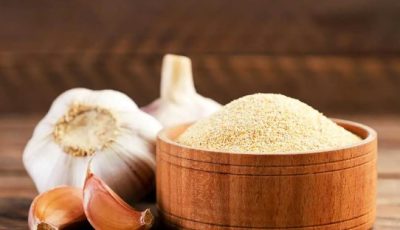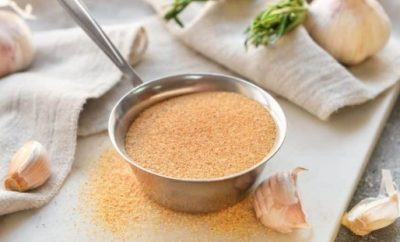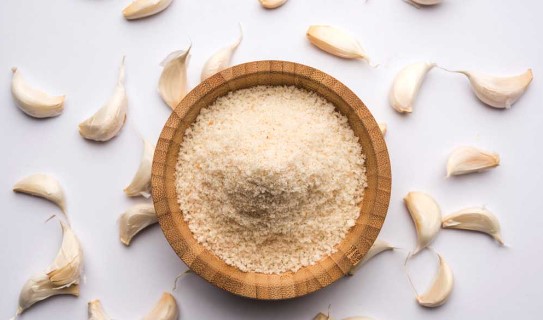We can’t go without garlic powder when it comes to making dishes tastier. Besides, this ingredient offers many health benefits. We may want to deliver these merits to our dogs. But can dogs have garlic powder?
Garlic powder is not in the category of foods that our canine friends can have. Not only garlic powder but also garlic is harmful to dogs. Whenever you offer any food to your pet, be sure that it doesn’t have spices and ingredients like garlic powder, onion powder, chives, etc.
There are multiple reasons behind the toxicity of garlic powder for dogs. Let’s discover them through this article. So stay tuned.
Table of Contents
All About Garlic Powder
Garlic powder comes from dehydrated garlic that we use to make our dishes flavourful. Firstly we dry garlic, dehydrate it, and transform it into a powder version by using some appliances. In markets, you will get garlic powder as a seasoned salt or spice mix.

Garlic powder is available in two types, e.g. hardneck and softneck. Hardneck is stronger than the soft neck in taste. However, all varieties of this powder hold several nutrients. Such as protein, carbs, vitamin B1, vitamin B6, vitamin C, fats, and fibre.
Can Dogs Have Garlic Powder?
Although garlic powder poses many health benefits, they are not for everyone. Dogs don’t have the enzyme to adapt to veggies that come from the allium family. Unfortunately, garlic comes from this family, so indirectly garlic powder is harmful for them. Perhaps eating a pinch of this powder won’t do anything to your paw friend, yet it is not recommended.
According to veterinarians, pregnant dogs, puppies, or dogs with any health issues should avoid garlic powder completely. Besides, eating this powder will upset the GI tract of any mammal. The crucial results can be oxidative damage to the body, like anaemia.
Why Is Garlic Powder Bad For Dogs?
As we see, garlic powder does a two-in-one job, i.e. increases the taste and offers nutrients. Unfortunately, our canine friends can’t reap these benefits.
Garlic powder comes from garlic, and garlic belongs to the allium family. Maybe you know vets don’t allow dogs to eat onions, leeks, chives, scallions, and shallots. It is because they come from the allium family. In the same way, garlic powder is a no-no for them.
Garlic and other veggies of the allium family contain thiosulfate, which is toxic to dogs. When they eat any food containing thiosulfate, they go through hemolytic anaemia. This disorder destroys the red blood cells of dogs. Thiosulfate can also lead to other disorders, like methemoglobinemia and Heinz body anaemia. In such cases, the symptoms would be dark yellow urine, jaundice, lethargy, difficulty in breathing, and so on.

Eating garlic powder too much can lead to garlic toxicity or garlic poisoning in dogs. Its symptoms can be dehydration, anorexia, anaemia, depression, nausea, pale gums, seizure, yellow skin, cramps, diarrhoea, inflammation, and many more.
Some dogs stay under medication for various diseases, like heart disease, kidney disease, etc. Meanwhile, garlic powder interacts with medications, resulting in unwanted health issues. It means unhealthy dogs should have garlic powder even in small amounts.
What Should You Do When Dogs Eat Garlic Powder?
Since garlic powder falls into the category of unsafe foods for dogs, you can’t stay calm when your dog eats it. But yes, you have to handle the situation calmly.
You must notice the symptoms of your dog first. If he is throwing up, let him do that. But if he is throwing blood with vomit or diarrhoea, it means he needs urgent treatment. Also, inform his vet as he can prescribe the best medications based on the severity of your dog’s condition.
As said earlier, thiosulfate can damage the red blood cells of dogs. In that case, your vet may suggest a blood transfusion to bring the red blood cells back to their state.
Can Dogs Have Garlic Powder Sometimes?
A 10kg dog will give negative reactions from eating garlic powder when the amount is 200 grams. It means for per kg 20 grams of garlic powder is toxic.
If your dog licks a small portion of this powder, maybe he will be fine. However, the size of the dog depends on when it comes to toxicity from the consumption. If a German Shepherd eats one teaspoon of garlic powder and a Yorkie eats the same amount, their reactions will be poles apart. The Yorkie will start throwing up, while the German Shepherd will stay calm.
When we say dogs can eat garlic powder sometimes, it goes for the large breeds. Their ability to digest is comparatively more than smaller breeds. However, offering them any food from the allium family is not recommended. Always keep your dog away from garlic and garlic powder.
Frequently Asked Questions: Can Dogs Have Garlic Powder?
How much garlic powder is safe for dogs?
A small dog can have 5 grams of garlic powder, and a medium dog can have 10 grams. Large breeds can have 15 grams and extra-large breeds can have 20 grams. However, it is better not to offer them garlic powder at all.
Is garlic bread safe for dogs?
If garlic is not safe for dogs, so is the garlic bread. If a large breed eats one or two bites of this bread, maybe he won’t get any side effects. But if a puppy eats one bite of it, he will start throwing up.
Do dog foods have garlic powder?
In some dog foods, you will find trace amounts of garlic powder. Manufacturers include it in them because of its antifungal and antibacterial properties. These dog foods should be a part of dogs’ diet only when their vets approve them.
Is garlic powder unsafe for all pets?
Whether it is dogs, cats, or mice, garlic powder is unsafe for all mammals. The large breeds will hardly get any side effects from eating this powder, but that’s when they eat it in small amounts.
Final Thoughts
After learning about the side effects of garlic powder, we may have the question, Can dogs have garlic powder? The answer is no as this ingredient is made from garlic and garlic has thiosulfate. If you don’t want to compromise your dog’s health, don’t offer him garlic powder even in small amounts.
Since dogs are curious beings, they may eat this powder discreetly. You will know that by seeing his symptoms. That’s the time when you have to inform his doctor and opt for urgent treatment. But if he throws and feels relaxed after a certain time, maybe the severity of the reaction is less. In that case, you can just go with a few medications that his vet will prescribe.
















